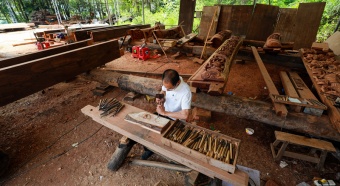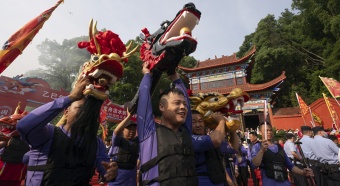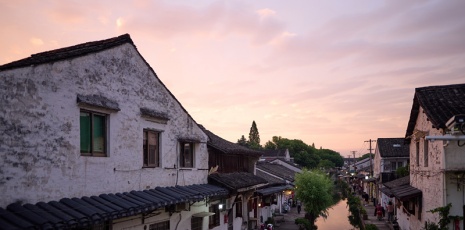(Global Times) 10:20, September 08, 2021
China's bay area flourishing, new growth pole for world economy

File photo shows a glimpse of Qianhai Shenzhen-Hong Kong Modern Service Industry Cooperation Zone in south China's Guangdong Province. (Photo/China News Service)
Authorities in China's Hong Kong Special Administrative Region (SAR) announced Tuesday that the city will soon lift strict restrictions on individual travel from the Chinese mainland and Macao. Experts said this is a significant move to open amid the COVID-19 pandemic, and it could offer a boost to the city's virus-stricken economy since arrivals from the Chinese mainland account for the majority of tourists and visitors to Hong Kong, meanwhile it will also expedite the economic integration of the Guangdong-Hong Kong-Macao Greater Bay Area.
Chief Executive of Hong Kong Carrie Lam said at Tuesday's weekly press briefing that the SAR government will roll out the "Come2HK" scheme on September 15, which will offer quarantine-free entry to non-Hong Kong residents from the Chinese mainland and Macao SAR.
Hong Kong will allow up to 1,000 visitors to cross the border every day at both Shenzhen Bay Port and the Hong Kong-Zhuhai-Macao Bridge Hong Kong Port.
Meanwhile, Lam announced the "Return2HK," a scheme that allows Hong Kong residents to return from the mainland without going through quarantine. The scheme was suspended in early August due to the epidemic flare-ups in some mainland localities.
"Apart from accelerating vaccination, schemes like 'Come2HK' and 'Return2HK' will help restore exchanges with the mainland, especially increase the exchanges of personnel, capital and trade between the two places, thereby greatly improving Hong Kong's job market and injecting more vitality into Hong Kong's economic development," Liang Haiming, dean of the Belt and Road Institute at Hainan University, told the Global Times on Tuesday.
Prior to this, some Hong Kong industries such as tourism, aviation and logistics have been hit hard due to the strict restrictions on exchanges with the mainland. And it is temporarily difficult for the unemployment rate to return to the pre-epidemic 3 percent level, Liang noted.
Hong Kong's unemployment rate fell to the lowest level since the start of the COVID-19 pandemic last year, down to 5 percent in the three months to the end of July.
The Chinese central government rolled out two concrete plans this week, stipulating to create new home space to provide convenience to residents from both Hong Kong and Macao in their life and employment in the Greater Bay Area.
In the near future, Hong Kong residents can expect to enjoy convenience in areas such as transportation, communications and payment in the Qianhai economic zone in Shenzhen, Guangdong Province, according to a development plan for a cooperation zone for Shenzhen and Hong Kong that was issued on Monday.
Separately, Chinese central authorities unveiled one day earlier a plan for the Guangdong-Macao in-depth cooperation zone in the Hengqin economic zone in Zhuhai, Guangdong to bolster Macao's higher education, scientific research and development, the tourism and leisure industry and finance.
The plan includes measures to build Hengqin into a new home for Macao residents to live and work in, such as exemption of income tax margins, lowering and gradually calling off charges for long-distance phone calls and cross-border internet connections between the two places.
Kris Tsang, founder of Shenzhen-based 708090 Co-working Space, told the Global Times on Tuesday that his firm, established six years ago in Qianhai, has witnessed many young entrepreneurs from Hong Kong chasing their dreams in the mainland.
"The release of the Qianhai plan further reinforces the confidence of more Hong Kong youth who have the willingness and determination to enter mainland markets especially starting from the Greater Bay Area," Tsang noted.
Dynamic integration
As southern China is now undergoing a once-in-a-century transformation both economically and socially, with the accelerated construction of the Greater Bay Area which was incubated from an ambitious blueprint two years ago now forged to down-to-earth action plans, the Hong Kong and Macao SARs have felt the urge to participate widely in the nation's dual circulation strategy.
The move not only enriches the practice of "one country, two systems," experts said, but also demonstrates the nation's unwavering determination to push high-level opening-up.
Lam on Monday called on various sectors in Hong Kong to seize the opportunities from new the plans concerning Qianhai and Zhuhai and push forward the development of the Greater Bay Area.
"According to my observations, more business entities from Hong Kong and Macao are actively exploring opportunities in Guangdong by tapping the advantages of supportive policies in the Greater Bay Area," Deng Yu, senior analyst at the Bank of Communications, told the Global Times on Tuesday.
Deng attributed the attractiveness of the Greater Bay Area to its regional synergistic development, which also differentiates itself from other three global bay areas - New York, San Francisco and Tokyo.
The number of Global Fortune 500 companies' headquarters in the Greater Bay Area has surpassed that in New York for the first time, becoming a new growth pole for the world's economy, according to research by the 21st Century Business Herald in August. With four new companies added, China's Greater Bay Area became host to 25 Global Fortune 500 companies this year, outweighing New York which has 24.
As one of the most economically vibrant areas in China, the Greater Bay Area contributed to 12 percent of the country's GDP with less than 0.6 percent of the country's area and permanent population of about 70 million as of the end of 2020, official data showed.
However, compared with three other global bay areas where between 80 and 90 percent of GDP comes from the tertiary sectors, the proportion of tertiary industries in the Greater Bay Area is just over 60 percent of the economy, meaning there is huge room to grow.
"High-end manufacturing, high technologies, modern services and finance are the pillar industries that the Greater Bay Area will push ahead with utmost efforts in the current transitional period by drawing on years of accumulated manufacturing capabilities in Dongguan, innovation capabilities in Shenzhen and Hong Kong's world-class financial services," Deng said.
New 'one country, two systems'
Under the plan, Hengqin, which is three times the area of Macao, will be run under a dual-leadership model via a committee co-led by the chief executive of Macao and the governor of Guangdong Province. The committee will decide on major plans, policies and important personnel appointments within the zone.
"The plan has showed a new idea in governance to specifically deal with the situation in Macao, as the special administrative region needs to find more diversified paths for development in the future rather than merely relying on gambling industry," Li Xiaobing, an expert on Hong Kong, Macao and Taiwan studies at Nankai University in Tianjin, told the Global Times on Tuesday.
Macao needs more land to realize those new constructions, but now the new development idea is not just about Guangdong providing lands or construction only and leaving the governance to Macao, Li said.
"The central government wants both sides to find an innovative model of governance that can effectively combine the advantages of the two systems, and to maximize their unique strong points," he said.
But there are some external voices, which remain suspicious and hostile toward the Chinese mainland, who said the move is intended to change "one country, two systems" into "one country, one system," and in the future, a similar measure will be implemented in Hong Kong as well.
Chinese mainland experts said that "one country, two systems" is a dynamic idea and it should be improved and innovated with the development of the country and the change of the international situation.
In recent years, the development of Hong Kong and Macao has been slower than most major cities in the mainland, so in fact the two SARs desperately need integration with the mainland to seek a new development path, said experts.
The 2019 political turmoil in Hong Kong had exposed that the city needs reform and innovation in governance to solve long-standing problems, so this kind of problem-oriented idea is guiding the country to issue new plans and explore new paths for "one country, two systems," analysts noted.
At present, Hong Kong and Macao have very different development models, and they are facing different problems and challenges, so they cannot share every experience or measure, but if Guangdong and Macao have a successful experience in the Hengqin cooperation zone, it will be possible to see another zone emerge between Shenzhen and Hong Kong, analysts said.









